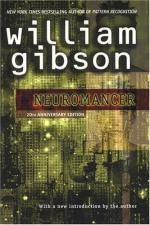|
This section contains 5,455 words (approx. 19 pages at 300 words per page) |

|
SOURCE: Schroeder, Randy. “Neu-Criticizing William Gibson.” Extrapolation 35, no. 4 (winter 1994): 330-41.
In the following essay, Schroeder offers a critical assessment of the relationship between cybernetics and postmodernism in Neuromancer.
Back in 1983 Time named the computer “Machine of the Year.” This award displaced the usual “Man of the Year,” presumably decentering the human and giving postmodernism permanent status in pop consciousness. In 1984 William Gibson published Neuromancer, presumably giving literary expression to the confluence of cybernetics and postmodernisms. In fact, the subgenre of cyberpunk is widely reported to be both postmodern art and postmodern artifact par excellence, literary examination and product of the post-age.
This assumption has driven some fine criticism. Gibson's information-age world has been examined as a place where distinctions such as human/machine and real/artificial are deconstructed, as invasive technology redefines the human condition. The locus of criticism has been those points where cybernetic technology and postmodern...
|
This section contains 5,455 words (approx. 19 pages at 300 words per page) |

|


